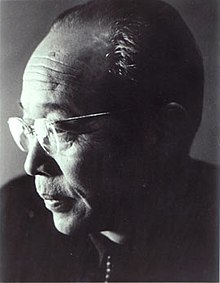Kenji Mizoguchi

Kenji Mizoguchi (溝口 健二, Mizoguchi Kenji, 16 Mayıs 1898 – 24 Ağustos 1956), Japon film yönetmeni ve senaristtir.
Mizoguchi'nin eseri, uzun süren çekimler ve mizanseni ile ünlüdür.[1] Yazar Mark Le Fanu'ya göre, "Filmleri olağanüstü bir güç ve saflığa sahip, izleyiciyi insan acılarıyla yüz yüze kaldıkları güç, incelik ve merhametle sallamakta hareket ettiriyorlar."[2] şeklinde ifadetmiştir.
Ugetsu (1953), Venedik Film Festivali'nde Gümüş Aslan'ı kazandı ve 1962 ve 1972 yıllarındaki Sight & Sound Critics Top Ten Anketinde yer aldı. Diğer Kritiklerin Öyküsü (1939), Oharu'nun Hayatı (1952) ve Yargıtay Sansosu (1954) gibi Mizoguchi'nin diğer tanınmış filmleridir.
Filmografi
- 1923 813 (The Adventures of Arsène Lupin)
- 1923 Blood and Soul (Chi to Rei)
- 1923 Dreams of Youth (Seishun no Yumeji)
- 1923 Foggy Harbour (Kiri no Minato)
- 1923 Harbour of Desire (Joen no Chimata)
- 1923 In the Ruins (Haikyo no Naka)
- 1923 Song of Failure (Haisan no Uta wa Kanashi)
- 1923 The Night (Yoru)
- 1924 Chronicle of the Rainy Season (Samidare Zoshi)
- 1924 Death at Dawn (Aka Tsuki no Shi)
- 1924 Queen of Modern Times (Gendai no Jo)
- 1924 Queen of the Circus (Kyokubadan no Jo)
- 1924 Song of the Mountain Pass (Toge no Uta)
- 1924 Strong is the Female (Jose wa Tsuyoshi)
- 1924 The Sad Idiot (Kanashiki Hakuchi)
- 1924 This Dusty World (Jin-Kyo)
- 1924 Turkeys in a Row/The Trace of a Turkey (Shichimencho no Yukue)
- 1924 Woman of Pleasure (Kanraku no Onna)
- 1925 A Sketch on the Road/Street Scenes (Gaijo no Sukechi)
- 1925 General Nogi and Kuma-San (Nogi Taisho to Kuma-San)
- 1925 No Money, No Fight (Musen Fusen)
- 1925 Out of College (Gakuso o Idete)
- 1925 Song of Home (Furusato no Uta)
- 1925 The Earth Smiles (Daichi wa Hohoemu)
- 1925 The Human Being (Ningen)
- 1925 The White Lily Laments (Shirayuki wa Nageku)
- 1925 Under the Crimson Sunset (Akai Yuki ni Terasarete)
- 1926 A Paper Doll’s Whisper of Spring (Kami-Ning-Yo Haru No Sasayaki)
- 1926 It’s My Fault New Version (Shin Onoga Tsumi)
- 1926 Kin[3]
- 1926 Passion of a Woman Teacher (Kyoren no Onna Shisho)
- 1926 The Boy From the Sea (Kaikoku Danji)
- 1926 The Copper Coin King (Doka-O)
- 1927 The Cuckoo New Version (Jihi Shincho)
- 1927 The Imperial Grace (Ko-On)
- 1928 A Man’s Life (Hito no Issho)
- 1928 My Loving Daughter (Musume Kawaiya)
- 1929 Bridge of Japan (Nihonbashi)
- 1929 Metropolitan Symphony (Tokai Kokyogaku)
- 1929 The Morning Sun Shines (朝日は輝く Asahi wa kagayaku)
- 1929 Tokyo March (東京行進曲 Tōkyō kōshin-kyoku)
- 1930 Hometown (Fujiwara Yoshie no furusato)
- 1930 Tojin Okichi (唐人お吉 Tōjin Okichi)
- 1931 And Yet They Go On (Shikamo Karera wa Yuku)
- 1932 Dawn in Manchuria/The Dawn of the Founding of Manchuko and Mongolia
- 1932 The Man of the Moment/Timely Mediator (Toki no Ujigami)
- 1933 Gion Festival (Gion Matsuri)
- 1933 The Shimpu Group (Shimpu-Ren)
- 1933 Cascading White Threads/White Threads of the Waterfall/The Water Magician (滝の白糸 Taki no Shiraito)
- 1934 Aizō Tōge (愛憎峠 "The Mountain Pass of Love and Hate"), a lost film.[4]
- 1935 Oyuki the Virgin (Maria no Oyuki)
- 1935 The Downfall of Osen (折鶴お千 Orizuru Osen)
- 1935 The Poppy (Gubijin-so)
- 1936 Naniwa Elegy a.k.a. Osaka Elegy (浪華悲歌 Naniwa hika or Naniwa erejī)
- 1936 Sisters of the Gion (祇園の姉妹 Gion no kyōdai)
- 1937 Straits of Love and Hate (愛怨峡 Aien kyō)
- 1938 Song of the Camp (Roei no Uta)
- 1939 The Story of the Last Chrysanthemums (残菊物語 Zangiku monogatari)
- 1940 A Woman of Osaka (Naniwa Onna)
- 1941 The 47 Ronin a.k.a. The Loyal 47 Ronin of the Genroku Era (元禄忠臣蔵 Genroku chūshingura)
- 1941 The Life of an Actor (Geido Ichidai Otoko)
- 1944 Miyamoto Musashi (宮本武蔵)
- 1944 Three Generations of Danjuro (Danjuro Sandai)
- 1945 The Famous Sword Bijomaru (名刀美女丸 Meitō Bijomaru)
- 1945 Victory Song (Hisshoka) Dir: Masahiro Makino and Hiroshi Shimizu (Mizoguchi directed opening sequence only)
- 1946 Utamaro and His Five Women a.k.a. Five Women Around Utamaro (歌麿をめぐる五人の女 Utamaro o meguru gonin no onna)
- 1946 Victory of Women (Josei no Shori)
- 1947 The Love of the Actress Sumako (女優須磨子の恋 Joyū Sumako no koi)
- 1948 Women of the Night (夜の女たち Yoru no onnatachi)
- 1949 Flame of My Love (わが恋は燃えぬ Waga Koi wa Moenu)
- 1950 Portrait of Madame Yuki a.k.a. A Picture of Madame Yuki (雪夫人絵図 Yuki fujin ezu)
- 1951 Miss Oyu (お遊さま Oyū-sama)
- 1951 The Lady of Musashino a.k.a. Lady Musashino (武蔵野夫人 Musashino fujin)
- 1952 The Life of Oharu (西鶴一代女 Saikaku ichidai onna)
- 1953 A Geisha a.k.a. Gion Music Festival (祇園囃子 Gion bayashi)
- 1953 Ugetsu (雨月物語 Ugetsu monogatari)
- 1954 Sansho the Bailiff (山椒大夫 Sanshō dayū)
- 1954 The Crucified Lovers a.k.a. A Story from Chikamatsu (近松物語 Chikamatsu monogatari)
- 1954 The Woman in the Rumor a.k.a. The Crucified Woman (噂の女 Uwasa no onna)
- 1955 Tales of the Taira Clan (Shin Heike Monogatari)
- 1955 Princess Yang Kwei-Fei (Yokihi)
- 1956 Street of Shame (Akasen Chitai)
Kaynakça
- ^ Thomas, Kevin (6 Ocak 1997). "A Closer Look at a Japanese Master". The Los Angeles Times. 15 Temmuz 2012 tarihinde kaynağından arşivlendi. Erişim tarihi: 23 Kasım 2010.
- ^ Le Fanu 2005, s. 1
- ^ Şablon:Cite-jcdb-title
- ^ Şablon:Audie-bock-directors
Dış bağlantılar
- IMDb'de Kenji Mizoguchi
- Acquarello: "Kenji Mizoguchi". Strictly Film School
- Jacoby, Alex: "Kenji Mizoguchi". Senses of Cinema, Great Directors: A Critical Database29 Ocak 2013 tarihinde Wayback Machine sitesinde arşivlendi.
- Kenji Mizoguchi's grave









